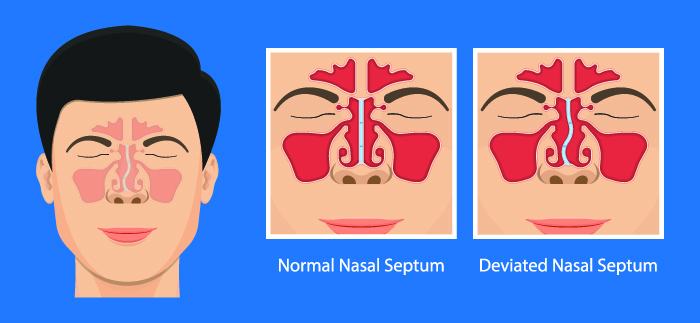Deviated Septum Surgery in Chembur, Mumbai
The septum separates the nasal passages. Deviation to one side or off-center cartilage or bone causes a deviated septum.
The nasal septum determines the appearance of the nose. As a result, any changes to the nasal septum will affect the nose’s overall appearance.

What is a deviated septum?
We know that the cartilage and bone in your nose is the nasal septum. The septum splits the nasal cavity into the right and left sides. When the septum is off-center or leans to one side of the nasal cavity, it is said to be “deviated”.
To seek treatment, you can consult an ENT specialist near you or visit an ENT hospital near you.
What are the symptoms of a deviated septum?
Most septal deformities have no symptoms, and you may not even be aware that you have one. However, some septal deformities can have the following signs and symptoms:
- One or both nostrils get blocked. This blockage can make breathing difficult. If you have a cold or allergies that cause your nasal passages to swell and narrow, you may notice this more.
- Your nasal septum layer may become dry, making nosebleeds more likely.
- Facial pain. Severely deviated septum exerts pressure, leading to one-sided facial pain.
- Noisy breathing during sleep. One of the many causes of noisy breathing while sleeping is a deviated septum or swelling of the intranasal tissues.
- Preference for sleeping on a particular side. Because of the narrowness of one nasal passage, some people may prefer to sleep on one side to improve breathing, which can cause a deviated septum.
What are the causes of a deviated septum?
A person can be born with the condition. It can also occur because of a nose injury. Contact sports, fighting and car accidents are all common causes of these injuries. The septum expands as one gets older.
When should I consult a doctor?
Consult your doctor if you’re having trouble breathing or experiencing symptoms that are affecting your quality of life.
You can request an appointment at Apollo Spectra Hospitals, Chembur, Mumbai.
Call 1860 500 2244 to book an appointment.
How is a deviated septum diagnosed?
A nasal speculum is used to examine your nostrils to diagnose a deviated septum. Your doctor will try to locate the septum and how it affects the size of the nostrils. Your doctor will also inquire about sleep, snoring, sinus issues and breathing difficulties.
How is a deviated septum treated?
The treatment focuses on keeping the deviated septum under control. It could be with the help of a few medications and a surgical procedure.
Your doctor may prescribe decongestants, antihistamines and nasal spray.
- Decongestants: Decongestants are medications that help keep the airways on both sides of your nose open by reducing nasal tissue swelling. Decongestants come as a pill or a nasal spray. However, use nasal sprays with caution.
- Antihistamines: Antihistamines are medications that help prevent allergy symptoms such as runny nose. They can also help with non-allergic conditions like a cold.
- Nasal steroid spray: Nasal corticosteroid sprays can help with nasal swelling and drainage. Steroid sprays take one to three weeks to ensure their maximum effect, so it’s critical to follow your doctor’s instructions when using them.
Septoplasty procedure is an outpatient procedure. Here are three steps for a septoplasty:
- Anesthesia: To ensure your comfort, your surgeon will use both local and general anesthesia. They numb the area with local anesthesia. During the procedure, they will sedate you with general anesthesia.
- Repairing the membrane: Your surgeon separates the membrane that covers the septum. The surgeon then removes the deviated cartilage and bone. Your surgeon will then replace the membranes and stitch them together.
- Bandaging: Your surgeon may use gauze to pack your nose. Depending on your surgery, you may have bandages on the outside of your nose.
They do a septoplasty through the nose. Sometimes, a surgeon will also perform sinus surgery (to open the sinuses) or rhinoplasty (nose reshaping). However, your doctor decides on the type of surgery.
Can I prevent a deviated septum?
Your doctor cannot prevent one from being born with a deviated septum. However, you can take steps to reduce your risk of injury if you don’t have a deviated septum at birth:
- During sports, wear a face mask or a helmet.
- Don’t forget to fasten your seatbelt.
- You can avoid high-contact sport.
Conclusion
A connective tissue disease is to blame for the deviation. Wear a face mask during sports to protect your nose or stay away from high-contact sports.
You need to understand that it will not heal on its own. As a result, it’s critical to address this problem as soon as possible. Failure to do so may cause issues like dry mouth, sleep disturbances and nasal congestion or pressure.
A deviated septum can have a high impact on your quality of life, both during the day with decreased breathing and especially at night with the low level of oxygen to the encephalon, a poor night’s sleep and even snoring.
A deviated nasal septum with nasal obstruction has far-reaching consequences for the body. By obstructing airflow, nasal obstruction disrupts the physiological ventilation of the lung. This decreases oxygenation in the lungs and increases respiratory and heart rates.
Symptoms
Our Doctors
DR. RINAL MODI
BDS...
| Experience | : | 8 Yeras Experience |
|---|---|---|
| Speciality | : | Dental and Maxillofa... | Location | : | Tardeo |
| Timings | : | Mon - Sat : 10:00 AM... |
DR. DIPAK DESAI
MBBS, MS, DORL...
| Experience | : | 21 Yeras Experience |
|---|---|---|
| Speciality | : | ENT, Head and Neck S... | Location | : | Tardeo |
| Timings | : | Available by prior a... |
DR. ANKIT JAIN
MBBS, MS (ENT)...
| Experience | : | 14 Yeras Experience |
|---|---|---|
| Speciality | : | ENT, Head and Neck S... | Location | : | Tardeo |
| Timings | : | Mon, Wed, Fri : 4:00... |
DR. KEYUR SHETH
DNB (Med), DNB (Gast...
| Experience | : | 7 Yeras Experience |
|---|---|---|
| Speciality | : | General Surgery & Ga... | Location | : | Chembur |
| Timings | : | Mon to Fri : 2:00 PM... |
DR. MEENA GAIKWAD
MBBS, MS (ENT)...
| Experience | : | 8 Yeras Experience |
|---|---|---|
| Speciality | : | ENT, Head and Neck S... | Location | : | Chembur |
| Timings | : | Mon - Sat : 6:30 PM ... |
DR. PRASHANT KEWLE
MS (ENT), DORL...
| Experience | : | 17 Yeras Experience |
|---|---|---|
| Speciality | : | ENT, Head and Neck S... | Location | : | Chembur |
| Timings | : | Mon - Sat : 4:00 PM ... |
DR. ROSHNI NAMBIAR
MBBS, DNB (ENT)...
| Experience | : | 19 Yeras Experience |
|---|---|---|
| Speciality | : | ENT, Head and Neck S... | Location | : | Chembur |
| Timings | : | Mon - Sat : 12:30 PM... |
DR. SHASHIKANT MHASHAL
MBBS, MS (ENT)...
| Experience | : | 22 Yeras Experience |
|---|---|---|
| Speciality | : | ENT, Head and Neck S... | Location | : | Chembur |
| Timings | : | Friday : 8:00 PM to ... |
DR. YASH DEVCKAR
MBBS, MS (ENT)...
| Experience | : | 11 Yeras Experience |
|---|---|---|
| Speciality | : | ENT, Head and Neck S... | Location | : | Chembur |
| Timings | : | Mon - Sat : 9:30 AM ... |
DR. GANGA KUDVA
MBBS, MS (ENT) , DNB...
| Experience | : | 12 Yeras Experience |
|---|---|---|
| Speciality | : | ENT, Head and Neck S... | Location | : | Tardeo |
| Timings | : | Available by prior a... |
DR. JAYESH RANAWAT
MBBS, MS, DNB, FCPS...
| Experience | : | 16 Yeras Experience |
|---|---|---|
| Speciality | : | ENT, Head and Neck S... | Location | : | Tardeo |
| Timings | : | Available by prior a... |
DR. MITUL BHATT
MBBS, MS (ENT), DNB ...
| Experience | : | 12 Yeras Experience |
|---|---|---|
| Speciality | : | ENT, Head and Neck S... | Location | : | Tardeo |
| Timings | : | Mon - Sat : 2:30 PM ... |
DR. SHRUTI SHARMA
MBBS,MS(ENT)...
| Experience | : | 15 Yeras Experience |
|---|---|---|
| Speciality | : | ENT, Head and Neck S... | Location | : | Tardeo |
| Timings | : | "Mon - Fri : 11:00 A... |
DR. NINAD SHARAD MULEY
BDS, MDS...
| Experience | : | 9 Yeras Experience |
|---|---|---|
| Speciality | : | Dental and Maxillofa... | Location | : | Chembur |
| Timings | : | Mon - Sat : 9:00 AM ... |
Our Top Specialities
NOTICE BOARD
CONTACT US
CONTACT US
 Book Appointment
Book Appointment















.jpg)
.svg)
.svg)
.svg)
.svg)








